Motivation Letter For Graduate School
[Your Name]
[Your Address]
[City, State, Zip Code]
[Email Address]
[Phone Number]
[Date]
[Admission Committee Name]
[Graduate School Name]
[Address]
[City, State, Zip Code]
Dear Members of the Admission Committee,
I am writing to express my sincere interest in pursuing a graduate degree at [Graduate School Name]. With great enthusiasm and a strong passion for [your field of study], I believe that [Graduate School Name] is the ideal institution to further my academic and professional journey.
Throughout my undergraduate years at [Your Undergraduate Institution], I have consistently strived to excel academically and actively engaged in various extracurricular activities. The exposure to diverse coursework and research opportunities has deepened my understanding of [your field of study] and its real-world applications. These experiences have not only shaped my analytical and critical thinking abilities but also inspired me to delve deeper into the challenges faced by our society, particularly in [specific area of interest].
What draws me most to [Graduate School Name] is its reputation for academic excellence and its commitment to fostering an intellectually stimulating environment. The distinguished faculty and state-of-the-art facilities present unparalleled opportunities for research and innovation, which I am eager to be a part of. Additionally, the collaborative nature of the programs at [Graduate School Name] aligns perfectly with my belief that interdisciplinary collaboration is crucial in tackling complex global issues.
Beyond academics, I am impressed by [Graduate School Name]'s emphasis on community engagement and its efforts to create positive societal impact. As someone who values social responsibility, I am eager to contribute my skills and knowledge to meaningful projects and initiatives, both within the campus community and beyond.
My long-term career aspirations involve [your career goals and how the graduate program aligns with them]. I believe that the comprehensive curriculum and hands-on experiences offered by [Graduate School Name] will provide me with the tools and expertise necessary to succeed in this field.
I am confident that my dedication, adaptability, and perseverance will enable me to thrive in the challenging academic environment of [Graduate School Name]. Given the opportunity, I am committed to making a positive difference not only in my academic journey but also in the broader academic community.
Thank you for considering my application to [Graduate School Name]. I look forward to the prospect of contributing my unique perspectives and insights to your esteemed institution. Please find my enclosed application and supporting documents for your review.
Should you require any further information or have any questions, please do not hesitate to contact me at [Your Email Address] or [Your Phone Number].
Sincerely,
[Your Name]
Formal Motivation Letter for Graduate School
Subject: Motivation Letter for Graduate Program Application
Dear [Admissions Committee],
I am writing to express my strong interest in applying for the [Program Name] at [University Name]. Having completed my undergraduate studies in [Field] at [Your University], I have developed a solid foundation in [Key Skills or Knowledge Areas].
My motivation to pursue graduate studies stems from my desire to deepen my expertise in [Specific Field or Topic] and contribute to research in [Relevant Area]. I have gained practical experience through [Internships, Projects, or Work Experience], which has prepared me for the rigorous academic challenges ahead.
I am particularly drawn to [University Name] because of its esteemed faculty, research opportunities, and collaborative environment. I am confident that this program will enable me to achieve my professional and academic goals.
Thank you for considering my application. I would be honored to join your program and contribute meaningfully to the academic community.
Sincerely,
[Your Name]
[Contact Information]
Creative Motivation Letter for Graduate School
Subject: My Passion for [Field] – Motivation Letter
Dear [Admissions Committee],
Ever since I first encountered [Specific Experience], I have been captivated by [Field/Topic]. This fascination has guided my academic journey and inspired me to seek advanced studies at [University Name].
During my undergraduate studies, I explored [Key Projects or Research Experiences] and discovered my passion for [Specific Focus]. I am eager to bring creativity, curiosity, and dedication to your graduate program, contributing not only academically but also to the university community.
I am enthusiastic about the prospect of working with esteemed faculty and collaborating with like-minded peers to advance knowledge and solve real-world challenges in [Field].
Thank you for considering my application.
Warm regards,
[Your Name]
Heartfelt Motivation Letter for Graduate School
Subject: Motivation Letter for [Program Name]
Dear Members of the Admissions Committee,
From a young age, I have been driven by curiosity and a desire to make a meaningful impact in [Field]. My personal journey, shaped by [Challenges, Experiences, or Inspirations], has motivated me to pursue advanced studies in this area.
Through my undergraduate education and hands-on experiences, I have cultivated skills in [Key Areas] and developed a deep understanding of [Field]. I am eager to immerse myself in the [Program Name] at [University Name] to grow both intellectually and professionally.
I believe that my dedication, resilience, and passion align with the values of your program, and I look forward to contributing positively to the academic environment.
Sincerely,
[Your Name]
Quick Motivation Email for Graduate School
Subject: Graduate Program Application – Motivation Statement
Dear [Admissions Committee],
I am excited to apply for the [Program Name] at [University Name]. My academic background in [Field] and experience in [Relevant Experience] have prepared me for the challenges and opportunities of this program.
I am highly motivated to advance my expertise in [Specialization] and contribute to the research initiatives at your university. Thank you for your time and consideration.
Best regards,
[Your Name]
[Contact Information]
Professional Motivation Letter with Research Focus
Subject: Motivation Letter – Graduate Program Application
Dear [Admissions Committee],
I am applying to the [Program Name] at [University Name] to further develop my research skills in [Specific Area]. My undergraduate and internship experiences have allowed me to engage deeply with [Relevant Projects], fostering analytical and problem-solving abilities.
I am particularly interested in [Faculty or Research Group] for its innovative work in [Field]. I am confident that this program will provide the ideal platform to pursue my research interests and contribute valuable insights to ongoing projects.
Thank you for considering my application.
Sincerely,
[Your Name]
Who Should Write a Motivation Letter for Graduate School
Who Should Write a Motivation Letter for Graduate School
- Prospective graduate students applying to a master's or doctoral program.
- Individuals seeking scholarships or funding tied to graduate studies.
- Applicants aiming to demonstrate personal motivation, experience, and career goals.
- Those who wish to highlight research interests, achievements, and alignment with the program.
Whom the Motivation Letter Should Be Addressed To
Whom the Motivation Letter Should Be Addressed To
- The Admissions Committee of the specific graduate program.
- Program director or faculty coordinator when explicitly indicated.
- Scholarship committee if applying for funding.
- Ensure correct spelling of names and titles for formal address.
When to Write and Submit a Motivation Letter
When to Write and Submit a Motivation Letter
- Before the application deadline of the graduate program.
- When required by the university as part of the application package.
- When applying for scholarships, assistantships, or funding opportunities.
- Whenever you need to explain your motivation and suitability for the program.
How to Write a Strong Motivation Letter
How to Write a Strong Motivation Letter
- Begin with a compelling introduction stating your purpose.
- Highlight relevant academic, professional, and research experiences.
- Connect your goals with the program's offerings and faculty expertise.
- Maintain clarity, structure, and professional tone throughout.
- Proofread to avoid grammar or spelling errors.
Formatting Guidelines for Motivation Letters
Formatting Guidelines for Motivation Letters
- Length: typically 1–2 pages.
- Tone: professional, sincere, and focused.
- Structure: introduction, academic background, experiences, motivations, career goals, conclusion.
- Use clear paragraphs, avoid large blocks of text.
- For email submissions, include a concise subject line and proper salutation.
Requirements and Prerequisites Before Writing
Requirements and Prerequisites Before Writing
- Research the program and faculty thoroughly.
- Identify key skills, experiences, and achievements to include.
- Gather supporting documents such as transcripts, CV, or publications.
- Reflect on personal motivation, career objectives, and research interests.
- Understand the university's expectations and application guidelines.
Pros and Cons of Submitting a Motivation Letter
Pros and Cons of Submitting a Motivation Letter
Pros:
- Showcases personal motivation and unique qualities.
- Demonstrates preparedness and alignment with the program.
- Provides context for academic or professional achievements.
Cons:
- Requires careful drafting to avoid generic content.
- Overly long letters may reduce readability.
- Poorly written letters can negatively impact the application.
Common Mistakes in Motivation Letters
Common Mistakes in Motivation Letters
- Writing a generic letter without customization.
- Failing to connect personal goals with the program.
- Overloading the letter with irrelevant details.
- Poor grammar, spelling errors, or unclear phrasing.
- Neglecting proper structure and professional tone.
Elements and Structure of an Effective Motivation Letter
Elements and Structure of an Effective Motivation Letter
- Introduction: state purpose and program applied for.
- Academic Background: summarize relevant studies and achievements.
- Professional or Research Experience: highlight practical experiences.
- Motivation and Goals: explain why you chose this program.
- Alignment with Program: describe how your interests match faculty/research.
- Conclusion: summarize suitability and express enthusiasm.
- Contact Information: provide email and phone for follow-up.
Tricks and Tips for Writing a Winning Motivation Letter
Tricks and Tips for Writing a Winning Motivation Letter
- Tailor each letter to the specific program and faculty.
- Use specific examples and evidence to support claims.
- Be authentic, expressing genuine motivation and goals.
- Keep paragraphs concise and focused.
- Proofread multiple times and consider feedback from mentors or peers.
After Sending / Follow-up Steps
After Sending / Follow-up Steps
- Confirm receipt of the application if possible.
- Track deadlines for interviews or additional documentation.
- Prepare for potential interview questions related to your letter.
- Maintain polite communication and thank the committee if contacted.
- Keep a copy of the letter for reference during future communications.
Compare and Contrast Motivation Letters with Other Application Documents
Compare and Contrast Motivation Letters with Other Application Documents
- Versus CV/Resume: Focuses on personal motivation, not only achievements.
- Versus Recommendation Letter: Written by the applicant, not by a third party.
- Versus Statement of Purpose: Often overlaps, but motivation letters may be more personal and less technical.
- Provides context and narrative that complements transcripts and portfolios.
Does a Motivation Letter Require Attestation or Authorization?
Does a Motivation Letter Require Attestation or Authorization?
- Generally, no official attestation is required.
- Should be truthful and original; plagiarism or false claims may lead to rejection.
- Some universities may request signature or scanned copy to confirm authenticity.
- Ensure adherence to application guidelines regarding format and submission.

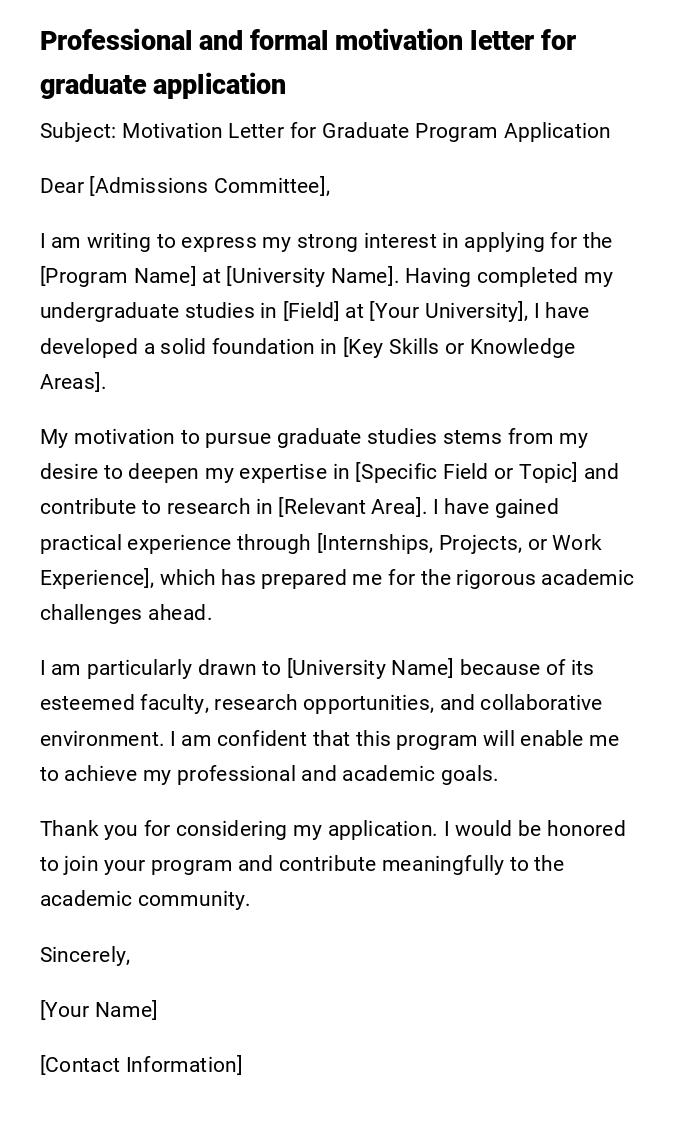
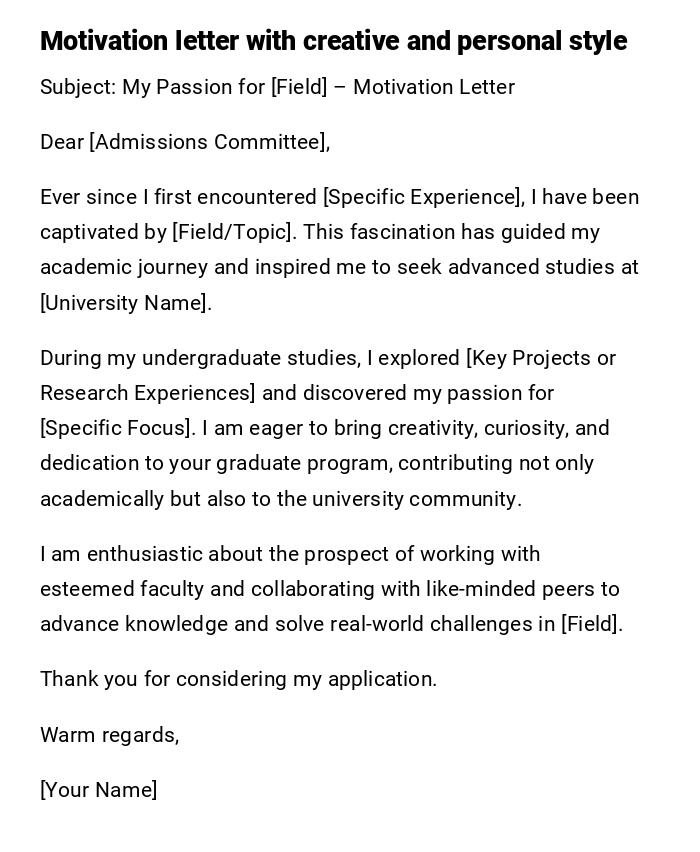
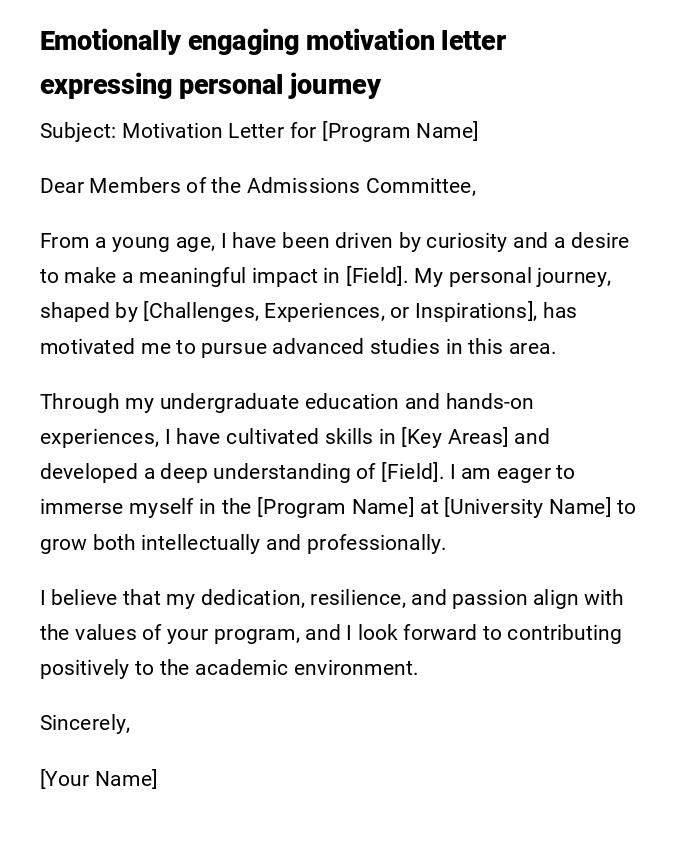
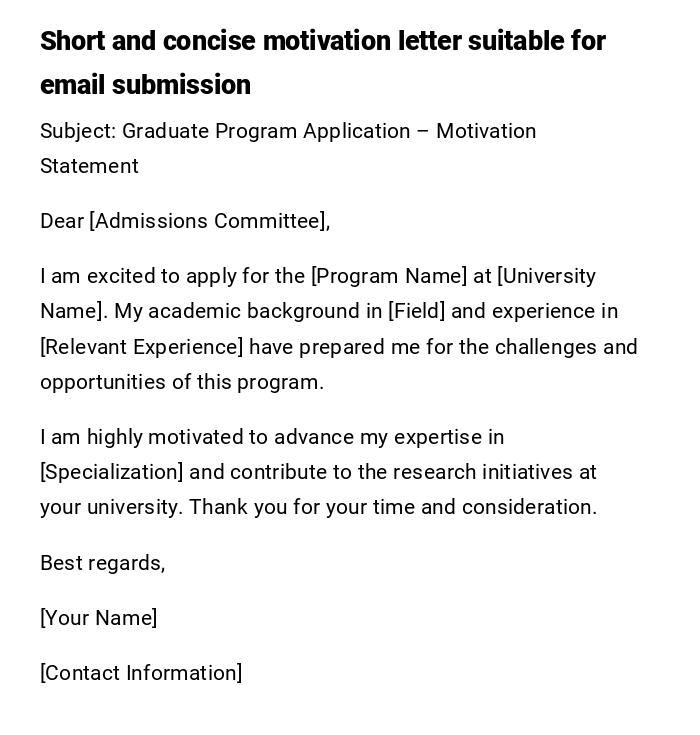
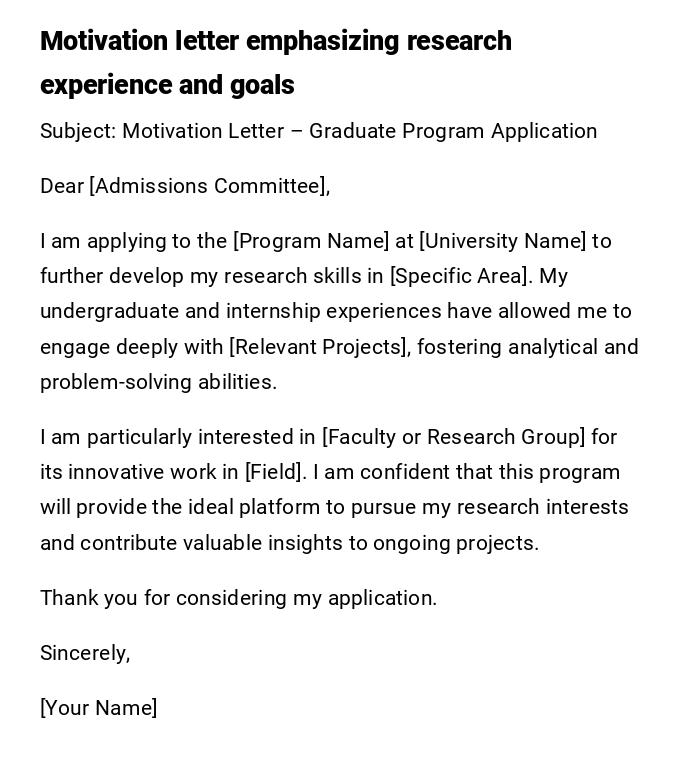

 Download Word Doc
Download Word Doc
 Download PDF
Download PDF